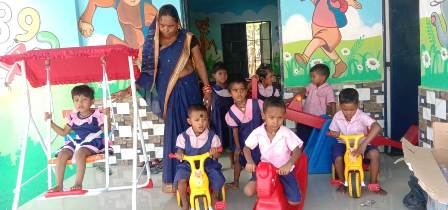Forest villages in Odisha’s Similipal, Hadagarh ranges suffer from apathy, negligence
Non-accordance of revenue village status stand in way implementation of govt initiatives
(Source: The Asian Age)
Bhubaneswar, May 2: For decades, they felt themselves as completely cursed souls. And then came a time when they felt that they were half relieved of the curse and nurtured a hope that the good days are not far away.
Perhaps, that wasn’t to be. They still languish in official apathy and indifference.
This is the story of four villages of Jamubani gram panchayat (GP) and some other ‘old habitations’ inside the Similipal Tiger Reserve in Odisha’s Mayurbhanj district. Moreover, nine other villages in the adjoining Hadagarh Elephant Reserve in Keonjhar district suffer from the identical plights.
While three of the villages under Jamubani GP came up in the 1950s, the fourth one – Jamubani itself – was established as a human habitation in the 1970s.
After the Wildlife (Protection) Act, 1972, the Kolha and Saunti tribal residents of these villages found themselves in deep trouble because of the restrictions imposed under The Wildlife (Protection) Act, 1972 and The Forest (Conservation) Act, 1980. Their habitation in the forest was seen as a threat to the wildlife. However, there are little instances of the tribals causing any harm to wildlife. On the contrary, the wildlife in the region has been living, and even growing, in complete harmony with these forest-dwellers.
The residents of these forest villages lead their life in abject poverty sans lack of any government-pushed economic activities in their locality. They survived on their primitive form of agriculture which was quite non-remunerative, collection of forest produces and fishing in Hadagarh dam. No roads and bridges could be built to link them to the outer world as the existing Forest Conservation Act, 1980 prohibited such construction in reserved forest areas.
After the Forest Rights Act, 2006 came into force and recognised that tribals living on forest lands before December 13, 2005 as bonafide inhabitants, a ray of hope emerged for themselves to lead hassel-free life sans any ‘harassment’ by forest officials who always wanted their relocation.
Made aware about their rights and privileges by Regional Center for Development Cooperation (RCDC), a Bhubaneswar based development organisation which is working of Forest Rights Act (FRA), the four villages – Boula, Jharjhari, Ashrurkhal and Jamubani – – applied and persuaded the state government for conversion of their habitations to revenue villages which they got on February 7, 2023.
“Though we have been living here for over seven decades, we are yet to see electricity. The villagers, especially those who can afford, manage with small solar- powered light units costing around Rs 2,000 each. Since we don’t have electricity, we cannot watch television and use fans,” says Janhabi Soy, Sarapanch of Jamubani GP. She, however, adds that with RCDC personnel and local people’s representatives, the residents have been putting pressure on the government to ensure that they avail the minimum basic facilities, including drinking water, schools, playgrounds and community halls.
After the villages under Jamubani gram panchayat (GP) got revenue status, the residents of the Hadagarh and Kanleibalipal GPs in the adjoining Keonjhar districts have been very optimistic about fulfillment of their demand for the same revenue village status to their habitations as they come under the ‘Old Habitation’ category in the Forest Rights Act, 2006.
“Villages under Hadagada and Kanaleibalipal GPs came up when people who migrated here after their houses got submerged following construction of the Hadagada dam over the Salandi river. We have prayed time again to the government for granting revenue village status to Malipasi, Saramundi, Kalelibalipal, Mayurnacha and Bhanara villages under Kanalelibalipal GP and Pitanau, Daliki, Ratanamara and Sujanapal under Hadagarh GP. However, due to faulty survey reports by the local revenue officials, we have been deprived of this status,” said Budhiram Purty, a resident of Kanaleibalipal.
It is pertinent to mention here that unless a habitation gets revenue village status, the government-run schemes and programmes cannot be implemented there.
(Written by A K Sahoo)








